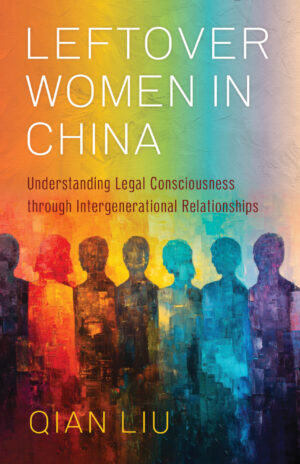When Parental Expectations Shape Our Legal Consciousness
By Qian Liu, author of Leftover Women in China: Understanding Legal Consciousness through Intergenerational Relationships
Like many authors, the very reason I wrote this book was to find an answer for myself. The writing process was my journey of trying to understand how to balance my filial obligation and my own resistance to the idea of following a timeline to get married and have children before being considered “leftover” in the marriage market. The stigmatizing term “leftover women,” which has been pervasive in everyday conversations in China since the 2000s, refers to women in their late twenties and beyond who have never married. In Leftover Women in China, I discuss how obligation and guilt resulting from the desire to live up to parental expectations shape leftover women’s decisions to follow, evade, and even manipulate the laws and policies that impose a fine on childbearing outside marriage, deny unmarried women’s access to assisted reproductive technology services, and refuse to recognize same-sex marriage.

Despite the powerful influence of parental expectations, one of the key points I make in Leftover Women in China is that what leftover women often describe as parental expectations are not necessarily their parental expectations, for at least two reasons. First, leftover women do not actually know what their parents really expect, since they are not supposed to openly discuss and negotiate with their parents about their obligations to marry and have children. In recent decades, the younger generation’s dependence on their parents for housing and childcare support, together with the sacrifices parents have made for their children, have reinforced the power imbalance between the two generations, leading daughters to prioritize parental expectations over their own desires. In this context, it becomes almost inappropriate to double check with their parents about their expectations because filial daughters should aim for things that work best for the interests of their parents. Second, leftover women often added “something” to parental expectations to construct what they perceive as parental expectations; and this “something” reflects their own evaluation of what would work best for the interests of their parents. In other words, what they call “parental expectations” are often their own perceptions and interpretations of what their parents may want. To complicate the situation further, out of the concerns about family reputation, leftover women are oftentimes more affected by the broader community’s expectations than what their parents explicitly tell them. Here, I use “broader community” to refer to unspecified people who participate in shaping the social norms and collective expectations in society and groups to which the leftover woman belongs.
Focusing on intergenerational relationships, my book demonstrates that our close relationships shape our legal consciousness—that is, how ordinary citizens understand and relate to the law—not only through love and emotional intimacy but also through our sense of obligation and guilt. Unlike reciprocal love, which fosters intimate communication, guilt can take up and sometimes even eliminate the space for equal and effective communication among close ones. The book calls for closer attention to the nuanced differences between the feeling of “love” and the sense of “obligation” in order to better understand the impact of relationships on our legal consciousness.
Learn more about Leftover Women in China.